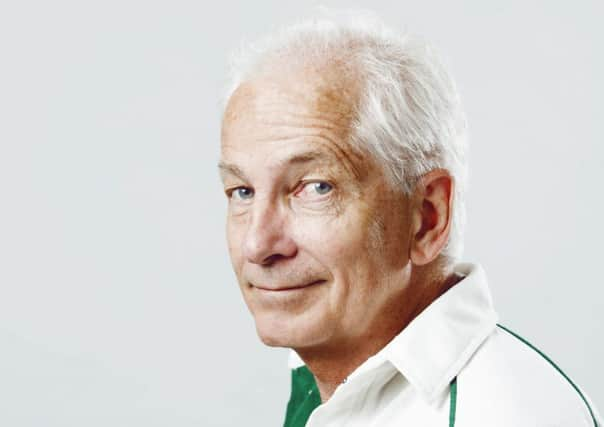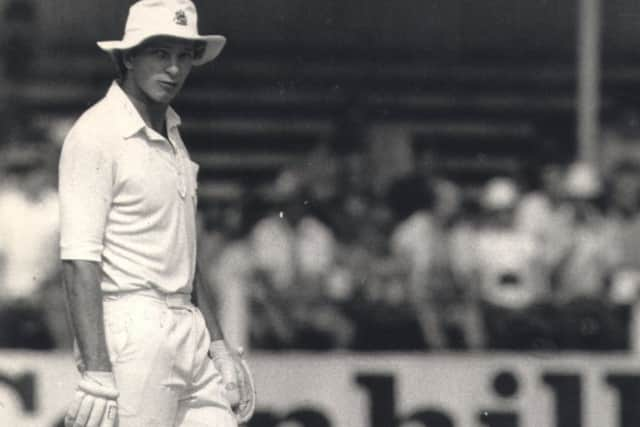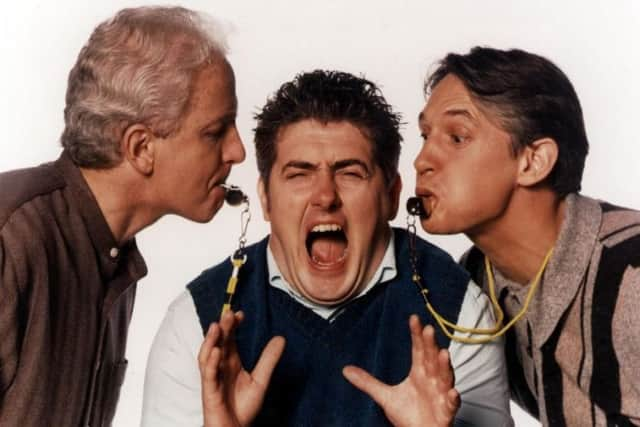David Gower on the Tiger Moth jape that downed his England career


From dashing batsman to unflappable broadcaster via an eight-year stint as a team captain on popular BBC comedy sports panel show They Think It’s All Over, David Gower has no shortage of stories to share from his extraordinary life. But there is one he gets asked about above all others –the time he took a joy ride in a pre-war Tiger Moth plane over an England warm-up match in Australia while his teammates were batting.
“I have a dozen cartoons on the subject, some of them well done, some of them not,” says Gower, who is bringing a national theatre tour to Halifax next year. “It has become part of my legend.”
Advertisement
Hide AdAdvertisement
Hide AdFor Gower and his fellow player Robin Morris, who was in a second Tiger Moth, the incident in which they flew low over the game in 1991 was “a bit of harmless fun”. But the England management took a very different view, fining the pair £1,000 each – they had paid only £27 for the flights. The situation was not helped by the pair posing for media pictures in the plane while wearing aviator goggles. But perhaps fortunately, a reported plan to drop water bombs on the ground did not come to fruition.


While he can smile about it now, the former England cricket captain turned Sky Sports presenter says he believes it led to the premature end of his international career. “Management took a very dim view,” he says. “It cost me a year and a half of Test cricket and I’m still not happy about that. It was something that was completely harmless. It wasn’t a Test match and the opportunity was unique because the airfield was right outside the ground. It was too good to miss. I’m not convinced players today would have the same opportunity and I suspect nobody would think about doing it. It is a very different atmosphere nowadays.”
Gower expects the incident to be a regular talking point as he takes a new solo show, entitled On The Front Foot, around theatres in the spring. But there will be much more to reflect for one of the country’s best-known sportsmen to reflect on. “Sport teaches you that at the moment you think you have cracked it, there will be something around the corner that proves you haven’t. For every great day, there are five terrible ones.”
Born in Kent, Gower spent his early years in Africa, where his father worked in the colonial service, overseeing large parts of what is now known as Tanzania. He went to boarding school in England from the age of eight and won a scholarship to his father’s old school in Canterbury, where he became captain of the cricket team. But life was far from easy; Gower’s father died when he was 15 after suffering with motor neurone disease and his mother had chronic asthma.
Advertisement
Hide AdAdvertisement
Hide AdThis year marks 40 years since the start of Gower’s international career, which began with him hitting the first ball he faced for four. “Whatever one’s reputation – and the words ‘laid’ and ‘back’ have been laid against me many a time – I was 21 years old and buzzing with nerves,” he recalls. “The ball I was bowled was a rank long hop and I just hit it; a career was up and running. At that stage, you have no idea how long it is going to last, whether it will be short-lived or long-lived. With playing sport at the highest level, if you walk out and respond positively to the atmosphere that is a good sign. I have seen players diminished by the pressure of playing in front of 90,000 at the MCG. But the best find it an exciting experience. The likes of Ian Botham would find that just brilliant and do his best to ruin the day of those who had come to see England lose. That is the test – if you walk out at Lord’s in front of 20,000 people and think, ‘This is fantastic’. If you are thinking, ‘I’m not sure about this’, you are in the wrong career.


“But of course there will always be times when nerves get the better of you. I would love to say I have always enjoyed it but if things have been going against you, it will be a test of confidence and self belief. If you are lacking that, then the first ten to 15 minutes of batting can be horrendous if you are out there in a test match not feeling quite right. But that can change day by day.
“On the bad days, either you find a way of coping or your day finishes very quickly. Everyone tells you – make the most of your good days.”
The highs and lows of international sport – and their relative unimportance compared to everyday life – were illustrated in 18 dramatic months between 1984 and 1986. First, Gower captained England to a winning tour of India that was almost called off after the Deputy High Commissioner of Western India was shot dead in Mumbai, the day after hosting a reception for the England team. The killing came less than a month after Indira Gandhi, India’s prime minister, was assassinated by her own bodyguard.
Advertisement
Hide AdAdvertisement
Hide Ad“With tours like that, you get carried away from the sport,” says Gower.
That was followed by Gower leading England to victory in the 1985 Ashes, a time he considers the highlight of his career. But it was swiftly followed at the start of the following year by a 5-0 humiliation at the hands of the West Indies on a tour which came shortly after the death of his mother from heart failure.
“Everything against Australia seemed to click into place for me personally. As a captain, to be standing there on the balcony at the Oval, Ashes in hand, was very much the pinnacle. I was asked about the next tour to the West Indies, who were the top side in the world, and I said tongue in cheek, ‘I’m sure they will be quaking in their boots’. They obviously weren’t.”
But his flippant comment came back to haunt him as the West Indies players used it as motivation. England went on to be thrashed by a team Gower considers to be perhaps the best to have ever played the game.
Advertisement
Hide AdAdvertisement
Hide Ad“They had some of the greatest batsmen ever to play and the most fearsome bowling attack,” he says. “At the start of the 1986 tour, Mike Gatting who had been in really good form was hit and it made a horrible mess of his nose. Anyone who has played against quick bowling of 90mph know it is not going to be easy but things like that certainly concentrates the mind.
“You can’t really afford to be frightened. Nowadays there is much more protective clothing but you are allowed to be anxious.
“There is always a balance. It can be a cliché to talk about sport as lessons in life but there is a certain truth about that, especially in learning to cope with disappointment.”
Gower retired from cricket in 1993, having played 117 Test matches for England and becoming one of the nation’s leading all-time run scorers. But even in the 1980s, his nonchalant style of play and relaxed attitude off-the-field, led to suggestions he may have been more suited to an earlier age of the game. As cricket writer Scyld Berry put it in 1984: “Gower might have been more at home in the 1920s or 1930s, cracking a dashing hundred for MCC, the darling of the crowds, before speeding away in a Bugatti and cravat for a night on the town.”
Advertisement
Hide AdAdvertisement
Hide AdGower admits he may not have been best suited to the big-hitting style of the modern 20-over competitions like the Indian Premier League, where star players can earn huge salaries in a few weeks. “Only a few players at the top of the IPL make the big money and I’m not a Chris Gayle or Virat Kohli,” he says.
But he adds that he would be willing to give it a go - suggesting the success of the likes of cultured Sri Lankan batsman Mahela Jayawardene shows it would not be impossible for his style of play to succeed.
After retirement, Gower moved effortlessly into broadcasting, first with the BBC and Australia’s Channel Nine, as well as appearing on They Think It’s All Over between 1995 to 2003. But he is now best associated for his work as a presenter and commentator for Sky Sports. In recent years there have been question marks about his future with the broadcaster, but Gower says he hopes to continue for as long as possible. “It is one of those things where I don’t know how much longer it is going to last. It has been an absolute joy to be in the same environment. You are just at the other end of the game. It has been a huge joy and privilege and I hope it never stops.”
Gower says he does understand the anxiety about the lack of cricket on terrestrial television but points to the latest £200m-per-year television deal for the England and Wales Cricket Board, which will see the BBC showing live matches from a new 100-ball competition from 2020. “I do sympathise with those who feel they miss out but the onus is on the ECB to make the most of what they get.”
Advertisement
Hide AdAdvertisement
Hide AdGower says what he loves about cricket has changed over the years. “The initial answer is I was good at it. Then having been around it so long, I loved the camaraderie and there are so many life lessons from being involved in sport.
“The high points are wonderful and there are some incredibly low points you do your best to fight through and in doing so, you learn a lot about yourself.
“I have been very lucky.”
Treasured memories of Headingley 1981
David Gower says many of his favourite cricketing memories involve his good friend Ian Botham – particularly being in the same side as him during the famous 1981 Headingley Ashes Test match in which he rescued England from a seemingly-impossible position to inspire a famous win.
”He was dangerous to have in the dressing room and be with off the field! But there were so many things he did on the field that were extraordinary and to be near him at the time was equally extraordinary. Those are the things that live on forever.”
David Gower’s theatre tour will visit the Square Chapel Theatre in Halifax on May 23. To book tickets, visit www.david-gower.com or www.squarechapel.co.uk.